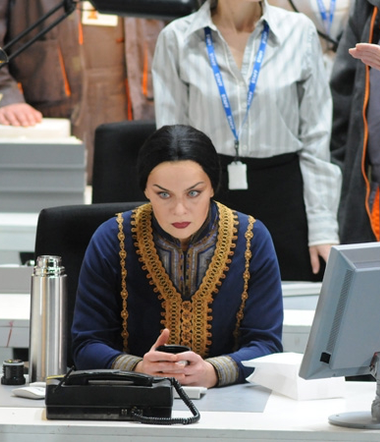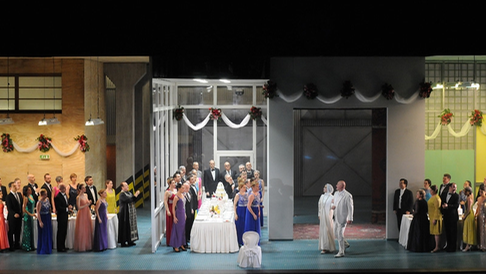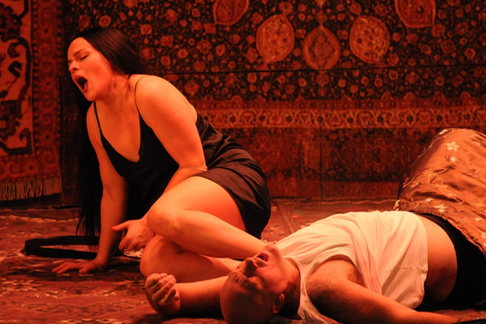Recently in Reviews
English Touring Opera are delighted to announce a season of lyric monodramas to tour nationally from October to December. The season features music for solo singer and piano by Argento, Britten, Tippett and Shostakovich with a bold and inventive approach to making opera during social distancing.
This tenth of ten Live from London concerts was in fact a recorded live performance from California. It was no less enjoyable for that, and it was also uplifting to learn that this wasn’t in fact the ‘last’ LfL event that we will be able to enjoy, courtesy of VOCES8 and their fellow vocal ensembles (more below …).
Ever since Wigmore Hall announced their superb series of autumn concerts, all streamed live and available free of charge, I’d been looking forward to this song recital by Ian Bostridge and Imogen Cooper.
The Sixteen continues its exploration of Henry Purcell’s Welcome Songs for Charles II. As with Robert King’s pioneering Purcell series begun over thirty years ago for Hyperion, Harry Christophers is recording two Welcome Songs per disc.
Although Stile Antico’s programme article for their Live from London recital introduced their selection from the many treasures of the English Renaissance in the context of the theological debates and upheavals of the Tudor and Elizabethan years, their performance was more evocative of private chamber music than of public liturgy.
In February this year, Albanian soprano Ermonela Jaho made a highly lauded debut recital at Wigmore Hall - a concert which both celebrated Opera Rara’s 50th anniversary and honoured the career of the Italian soprano Rosina Storchio (1872-1945), the star of verismo who created the title roles in Leoncavallo’s La bohème and Zazà, Mascagni’s Lodoletta and Puccini’s Madama Butterfly.
Evidently, face masks don’t stifle appreciative “Bravo!”s. And, reducing audience numbers doesn’t lower the volume of such acclamations. For, the audience at Wigmore Hall gave soprano Elizabeth Llewellyn and pianist Simon Lepper a greatly deserved warm reception and hearty response following this lunchtime recital of late-Romantic song.
Collapsology. Or, perhaps we should use the French word ‘Collapsologie’ because this is a transdisciplinary idea pretty much advocated by a series of French theorists - and apparently, mostly French theorists. It in essence focuses on the imminent collapse of modern society and all its layers - a series of escalating crises on a global scale: environmental, economic, geopolitical, governmental; the list is extensive.
For this week’s Live from London vocal recital we moved from the home of VOCES8, St Anne and St Agnes in the City of London, to Kings Place, where The Sixteen - who have been associate artists at the venue for some time - presented a programme of music and words bound together by the theme of ‘reflection’.
'Such is your divine Disposation that both you excellently understand, and royally entertaine the Exercise of Musicke.’
Amongst an avalanche of new Mahler recordings appearing at the moment (Das Lied von der Erde seems to be the most favoured, with three) this 1991 Mahler Second from the 2nd Kassel MahlerFest is one of the more interesting releases.
‘And there was war in heaven: Michael and his angels fought against the dragon; and the dragon fought and his angels, And prevailed not; neither was their place found any more in heaven … that old serpent … Satan, which deceiveth the whole world: he was cast out into the earth, and his angels were cast out with him.’
If there is one myth, it seems believed by some people today, that probably needs shattering it is that post-war recordings or performances of Wagner operas were always of exceptional quality. This 1949 Hamburg Tristan und Isolde is one of those recordings - though quite who is to blame for its many problems takes quite some unearthing.
There was never any doubt that the fifth of the twelve Met Stars Live in Concert broadcasts was going to be a palpably intense and vivid event, as well as a musically stunning and theatrically enervating experience.
‘Love’ was the theme for this Live from London performance by Apollo5. Given the complexity and diversity of that human emotion, and Apollo5’s reputation for versatility and diverse repertoire, ranging from Renaissance choral music to jazz, from contemporary classical works to popular song, it was no surprise that their programme spanned 500 years and several musical styles.
The Academy of St Martin in the Fields have titled their autumn series of eight concerts - which are taking place at 5pm and 7.30pm on two Saturdays each month at their home venue in Trafalgar Square, and being filmed for streaming the following Thursday - ‘re:connect’.
The London Symphony Orchestra opened their Autumn 2020 season with a homage to Oliver Knussen, who died at the age of 66 in July 2018. The programme traced a national musical lineage through the twentieth century, from Britten to Knussen, on to Mark-Anthony Turnage, and entwining the LSO and Rattle too.
With the Live from London digital vocal festival entering the second half of the series, the festival’s host, VOCES8, returned to their home at St Annes and St Agnes in the City of London to present a sequence of ‘Choral Dances’ - vocal music inspired by dance, embracing diverse genres from the Renaissance madrigal to swing jazz.
Just a few unison string wriggles from the opening of Mozart’s overture to Le nozze di Figaro are enough to make any opera-lover perch on the edge of their seat, in excited anticipation of the drama in music to come, so there could be no other curtain-raiser for this Gala Concert at the Royal Opera House, the latest instalment from ‘their House’ to ‘our houses’.
"Before the ending of the day, creator of all things, we pray that, with your accustomed mercy, you may watch over us."
Reviews

31 Jan 2016
Lady Macbeth of Mtsensk in Lyon
This nasty little opera evening in Lyon lived up to the opera’s initial reputation as pure pornophony. This is the erotic Shostakovich of the D minor cello sonata, it is the sarcastic and complicated Shostakovich of The Nose . . .
It is the brash, devil-may-care young Shostakovich (24 years old) who explodes in facile, brilliant music that sometimes may crash into the obvious but usually soars magnificently into the shimmering ethos of animal youth. Shostakovich’s music did indeed shine absolutely unfiltered through this sordid tale of desire in an ugly world.
At least this is the way director Dmitri Tcherniakov tells the story, making the Shostakovich score and conductor Kazushi Ono’s orchestra the protagonist of his staging, laying bare in 14 tableaux (the nine of the libretto plus the five musical interludes he staged as well) striking metaphors of this musical world, the mere facts of the libretto summarily sacrificed to the more powerful musical meanings of each of the scenes.
Tcherniakov boxed the nineteenth century world of an 1865 novel (à la Turgenev) of the libretto into the confines of a modern mechanized warehouse. Within the warehouse there was a love den box à l’orientale, and finally a grim, prison cell box. The action was not a narrative. It was fourteen boxes exploding in sexual acts and in brutal violence (think strong lights flashing, blinding you to what you knew was going on). This when the scenes were not sarcastic comments on the czarist Russian past, and surely the Soviet present as well.
 Tableau 8, the wedding
Tableau 8, the wedding
The bright acoustic of the Opéra de Lyon favored its splendid resident orchestral resources for this piece, unabashedly unleashed by conductor Kazushi Ono in a precise reading of the score, of particular note the huge role of Shostakovich’s clarinets not to mention the shattering, unimaginably loud orchestral and percussion climaxes that made Stalin wince leading to the first official denunciation of Shostakovich.
It was three and one half hours of blatant musical eroticism and brutality laid bare by Tcherniakov. The missing atmospheres of the natural world and the human narrative of its book however made the evening seem very long and sometimes even painful.
Katerina Ismailova (aka Lady Macbeth) was Lithuanian soprano Ausrine Stundyte who has performed this huge role in the Calixto Bieito production at the Berlin Volksoper (the mind boggles imagining what this may have been). There had been whispers that San Francisco Opera was going to mount a Christopher Alden production — a project evidently sacrificed to SFO’s anti-opera business model. Ms. Stundyte gave a total performance, moving from the obvious frigidity imposed on her life to the heated passions of her murder of her rival in the riveting penultimate scene. Three police thugs then attacked and killed her in the maximally violent (think loud) final scene.
 Ausrine Stundyte as Katerina, John Daszak as Sergei
Ausrine Stundyte as Katerina, John Daszak as Sergei
The brutal tone of the production was established summarily by Katerina’s lover, Sergei, performed by the hulking body, shaved head and cutting voice of British tenor John Daszak (recently Loge in Bayreuth, and the Drum Major in Berlin). Sharply and urgently voiced Mr. Daszak was animal force and human cupidity personified. His too was a total performance, awarded by-the-way with less than appropriate applause at the curtain calls (at least it was not the outright hostility offered Tcherniakov’s equally unattractive Lady Macbeth [the Verdi soprano] at the Bastille a few years ago).
Russian bass Vladimir Ognovenko as the merchant and father Boris once again proved that there can be no Western substitute for a Russian bass. British tenor Peter Hoare convincingly portrayed Katerina’s impotent husband Zinoviy. All the supporting roles were cast with appropriately colored voices and personalities. This Lady Macbeth well sustains the Opéra de Lyon’s reputation as one of Europe's leading opera theaters.
Michael Milenski
Casts and production information:
Katerina Ismaïlova: Ausrine Stundyte; Boris Timoféiévitch Ismaïlov: Vladimir Ognovenko; Zinovy Boorisovitch Ismaïlov: Peter Hoare; Sergei: John Daszak;
Le Pope / Un Vieux bagnard: Gennady Bezzubenkov; Le Chef de la police: Almas Svilpa; Le Balourd miteux, un ouvrier dépravé: Jeff Martin; Sonietka: Michaela Selinger;
Aksinya: Clare Presland. Orchestre et Choeurs de l'Opéra de Lyon. Conductor: Kazushi Ono; Mise en scène et décors: Dmitri Tcherniakov; Costumes: Elena Zaitseva; Lumières: Gleb Filshtinsky. Opéra de Lyon, France, January 29, 2016.


